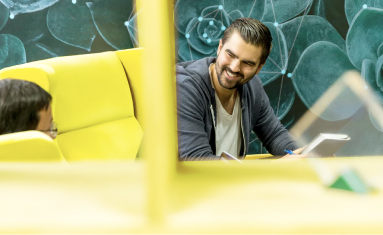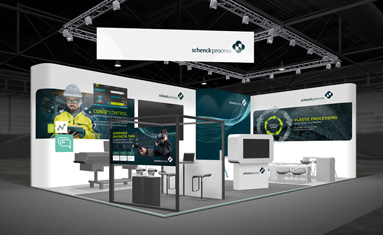Schenck Process Industry Expert Felix Jakob Discusses Bulk Material Handling in Recycling Processes
The drive to reduce the global carbon footprint and increase the use of recycled materials means that companies must rethink their current value chain end-to-end. This requires enhanced collaboration and sharing of expertise of all suppliers in the process chain to combine their expertise into viable processes and products. Felix Jakob, Director Sales Weighing Technology at Schenck Process Europe, explains the role of bulk material handling in this process and gives an outlook into the future.
Every year, Europe produces more than 53 million tons of plastic waste. Current trends predict this number to double by 2060, stressing the need for a more circular approach. Yet, the share of waste that is being returned to the production cycle remains relatively small in comparison, accounting for not even half of the generated tons. This partly stems from the fact that processed plastics, as opposed to virgin materials, comes with its own challenges. Plastic waste must meet strict specifications to be suitable for reprocessing, and handling large quantities needed in the recycling process is costly. In addition, the plastic materials vary greatly in quality, which further complicates the process.
“The feedstock and raw materials handled have in many cases very unpredictable and changing characteristics. They differ from lot to lot and from one country or region to another”, explains Felix Jakob, Director Sales Weighing Technology at Schenck Process Europe. “This requires a much higher flexibility and robustness of the process equipment in place.” Schenck Process is a leading solutions provider in bulk material handling. With more than 140 years of experience in this area, the Group holds extensive knowledge in the handling of diverse materials in a variety of industries, among them, producers of chemicals and performance materials.
“The transition from waste to wealth requires a holistic and collaborative approach that involves all stakeholders in the value chain working together towards a more sustainable and prosperous future.”
 Felix Jakob, Director Sales Weighing Technology
Felix Jakob, Director Sales Weighing Technology
Flexibility and Precision: Advantages of Intelligent Bulk Material Handling Solutions
Knowing how a material behaves over time is crucial when it comes to guaranteeing efficiency of recycling processes. “Traditional equipment and processes need to be adapted to be suitable for post-consumer recycling materials and higher content of recyclates.” This requires a long period of process development and testing along the full value chain. By gathering data and experience of process parameters through real-time measurement such as inline sensors for surveying moisture, solution providers can respond more flexibly to changes and keep processes stable. As such the digitalization of services and solutions plays a major role when it comes to making processes more efficient.
“Adding more intelligent machines to the process certainly results in more stable conditions,” explains Felix. Intelligent and connected material handling and feeding solutions, for example, provide greater stability, accuracy, and precision in dosing processes “which is critical in applications where small variations in material ratios or feed rates can impact product quality or process efficiency.” Such solutions can help reduce waste, improve efficiency, and recover valuable materials that can be sold or reused, thus generating new revenue streams, and reducing their environmental impact. This approach is particularly relevant in the context of the circular economy, where the goal is to create a closed-loop system where waste is minimized, and resources are conserved and reused to the greatest extent possible. “Ultimately, however, the transition from waste to wealth requires a holistic and collaborative approach that involves all stakeholders in the value chain, from suppliers to manufacturers to consumers, working together towards a more sustainable and prosperous future.”
While many plastic producers and solutions providers are already taking steps toward a greener future, initiating sustainable change requires more than just ideas. It demands commitment from all levels. “We are working in a very exciting time of change and many things will not return to how they used to be. The global pandemic has increased the impetus for digitalization which presents a huge opportunity for Europe to maximize their technology leadership in machine manufacturing and production”, Felix elaborates and adds: “On the other hand, the EU must ensure an economic environment in which producers will not suffer due to competitiveness in the global market. If this is controlled, we will see a stronger and greener Chemicals & Performance Materials industry by 2030.”





